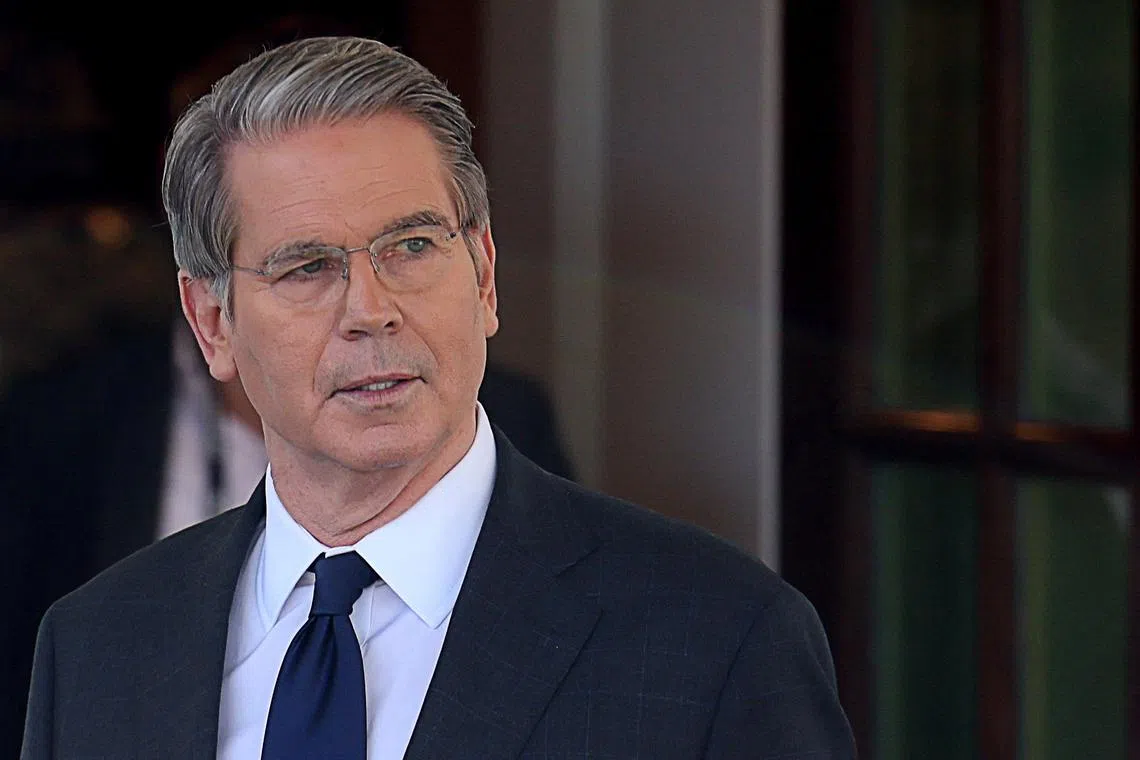Amid turmoil over tariffs, Bessent rises in Trump trade world
Sign up now: Get ST's newsletters delivered to your inbox

Treasury Secretary Scott Bessent has taken a larger role in articulating Mr Donald Trump’s trade policies.
PHOTO: REUTERS
Follow topic:
WASHINGTON - Minutes after US President Donald Trump announced a 90-day pause on a tariff plan
“President Trump created maximum negotiating leverage
It was the clearest sign yet of the larger role Mr Bessent has taken this week in articulating Mr Trump’s trade policies to the financial markets, even though his messaging has sometimes contradicted that of the President and business leaders.
Multiple sources close to the White House said Mr Bessent, a former hedge fund manager, was seen as the proverbial adult in the room, giving the President the best counsel among a team of advisers on trade that includes tariff hawk Peter Navarro and Commerce Secretary Howard Lutnick.
“The President is the one who ultimately... altered his strategy,” said Mr Stephen Moore, a long-time Trump adviser and economist at the Heritage Foundation, a conservative-think tank.
“But I think it was Scott who was always trying to take on the protectionists in the White House, who were always pressing Trump to go big on the tariffs.”
One White House official told Reuters Mr Bessent had favoured lower levies while Mr Navarro had favoured higher ones, though the whole trade team backed the decision Mr Trump announced on April 2 in the Rose Garden.
The multi-nation reciprocal tariffs plan wiped trillions of dollars off global stock markets and sparked fears of a recession. Stock markets zoomed higher on April 9 after the reprieve, with the S&P 500 posting its biggest daily gain since 2008.
Mr Bessent publicly stuck to the administration’s script in defending the original tariffs policy. But in private conversations, he moved the President towards negotiating with other countries, according to one source with close ties to the White House.
His interventions eventually won the day, at least temporarily. In a post on social media platform X on April 9, Mr Lutnick said he and Mr Bessent were with Mr Trump as the President wrote his social media post announcing the 90-day pause.
“There’s been a pecking order change,” the source said of Mr Bessent’s elevated role on Mr Trump’s trade team.
Former representative Charlie Dent, a Republican from Pennsylvania, described Mr Bessent as a “real adult in this room” who understood the economic implications of Mr Trump’s actions.
“I think it’s important that his voice has been elevated in this conversation,” said Mr Dent, while noting that uncertainty remained.
Mr Marc Short, Mr Trump’s legislative affairs director in 2017 and 2018, was less enamoured.
“He’s been out on the airwaves championing the strategy of global tariffs for the last few weeks,” Mr Short said of Mr Bessent. “While I’m relieved to see the reprieve, I’m not sure that... anybody in the White House looks like a victor right now. It appears as if they’re in retreat.”
The scope of the tariffs announced last week stunned virtually everyone – from private sector economists, who rapidly slashed their US economic projections, to adversaries including China’s leadership, which forcefully retaliated, as well as allies at home and abroad.
Normally loyal Republican lawmakers directed sharp criticism at Mr Trump and his lieutenants, while titans in the world of finance, such as Mr Larry Fink and Mr Jamie Dimon, balked. Even Mr Elon Musk, the billionaire leader of Mr Trump’s efforts to gut the federal government, lobbed insults at Mr Navarro on social media.
Over the weekend, Mr Bessent flew from New York to Florida, where Mr Trump was golfing, and then travelled back to Washington with the President to discuss their message about tariffs for the markets, the White House official said. The Treasury secretary emphasised the need to stress a willingness to make deals, the official said.
Mr Bessent told reporters on April 9 that he and Mr Trump had had a long conversation on April 6. “In my 35 years in the market, I always wanted certainty, so I think we’ve got more certainty,” he said.
White House rhetoric about the tariffs shifted this week, with press secretary Karoline Leavitt telling reporters on April 8 that Mr Trump was open to “tailor-made” agreements with other nations. The President tasked Mr Bessent and US Trade Representative Jamieson Greer to kick off talks with Japan.
Mr Bessent’s elevated perch might not last in an administration in which open warfare has raged between advisers such as Mr Navarro and Mr Musk.
And even as he appeared to gain influence, Mr Bessent’s message has not always aligned with what Mr Trump was saying.
Speaking to reporters outside the White House on April 9, Mr Bessent said the President had planned on the pullback all along, with an eye towards bringing countries to the bargaining table. But Mr Trump later indicated the near-panic in markets that had built since last week factored into his decision to change course. REUTERS

